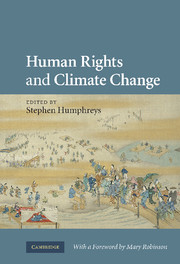Book contents
Appendix: climate change impacts on human rights
Published online by Cambridge University Press: 04 August 2010
Summary
Human rights impacts of climate change by region
Excerpts from IPCC, AR4, WG II, Summary for Policymakers, 13–15 and 59–63; and from The Stern Review, 103–5 (references excised).
Africa
IPCC AR4
By 2020, between 75 million and 250 million people are projected to be exposed to increased water stress due to climate change. If coupled with increased demand, this will adversely affect livelihoods and exacerbate water-related problems.
Agricultural production, including access to food, in many African countries and regions is projected to be severely compromised by climate variability and change. The area suitable for agriculture, the length of growing seasons and yield potential, particularly along the margins of semi-arid and arid areas, are expected to decrease. This would further adversely affect food security and exacerbate malnutrition in the continent. In some countries, yields from rain-fed agriculture could be reduced by up to 50 per cent by 2020.
Any changes in the primary production of large lakes are likely to have important impacts on local food supplies. For example, Lake Tanganyika currently provides 25 to 40 per cent of animal protein intake for the population of the surrounding countries, and climate change is likely to reduce primary production and possible fish yields by roughly 30 per cent. The interaction of human management decisions, including over-fishing, is likely to further compound fish off-takes from lakes.
Local food supplies are projected to be negatively affected by decreasing fisheries resources in large lakes due to rising water temperatures, which may be exacerbated by continued over-fishing.
[…]
- Type
- Chapter
- Information
- Human Rights and Climate Change , pp. 320 - 331Publisher: Cambridge University PressPrint publication year: 2009



